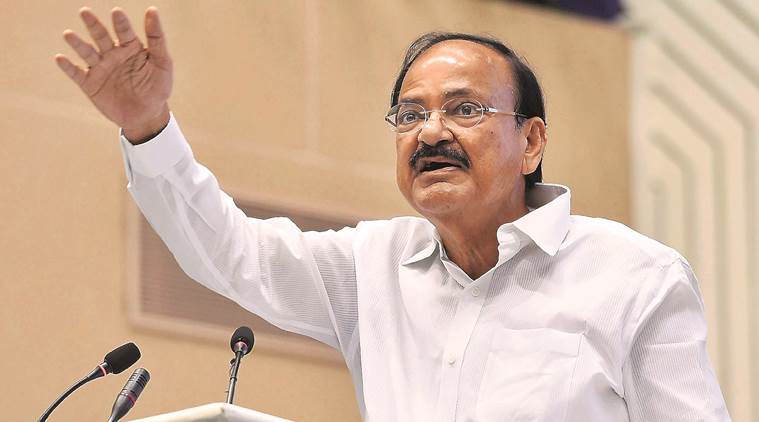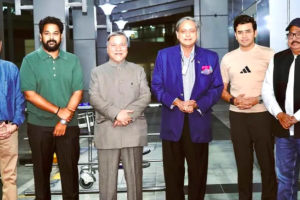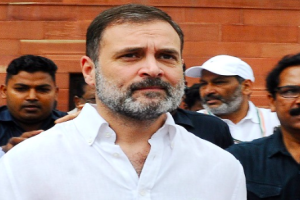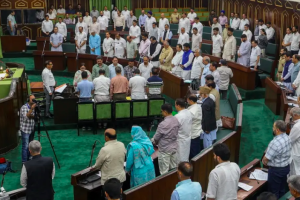Releases Commemorative Postage Stamp on Shri Banarsi Das Gupta
The Vice President of India, Shri M. Venkaiah Naidu has said that 4 Cs: Character, Calibre, Capacity & Conduct are important to Politicians; we need 4 Ps: Philosophy, Principles, Policies & Performance in politics and avoid 3 Cs: Community, Caste & Cash in Politics. He was addressing the gathering after releasing the Commemorative Postage Stamp on freedom fighter and parliamentarian, Shri Banarsi Das Gupta on the occasion of his Birth Centenary Celebrations organized by Banarsi Das Gupta Foundation, here today. The Union Minister for Women and Child Development, Smt. Maneka Sanjay Gandhi and other dignitaries were present on the occasion.
The Vice President said that Shri Banarsi Das was a true Gandhian, a great freedom fighter, a visionary, and a mass leader and he left his studies and plunged into the freedom movement led by Gandhi Ji. He further said that he launched agitation for establishment of a responsible Government in Jind State and was imprisoned several times. In the post-Independent period, he became a towering leader in the then existing State of Jind and was instrumental in paving the way for its merger with the Indian Union, he added.
The Vice President said that representing a vital link between the idealism of freedom struggle and the dreams of an independent and resurgent India, Shri Banarsi Das Ji was a far-sighted leader. He further said that he was a passionate social reformer who worked tirelessly to free India from the clutches of social evils, social oppressions, caste and gender inequalities. He was a crusader against untouchability, child marriage and dowry system and by waging a relentless struggle against the practice of untouchability, he helped Dalits get the right to enter temples and use public wells, he added.
The Vice President said that Shri Banarsi Das’s popularity among the people of Haryana was unparalleled, who elected him thrice to the Haryana Legislative Assembly. He further said that he also occupied the august Office of Speaker of that Assembly and he led the State of Haryana twice as its Chief Minister, he added. His association with our Parliament began in April 1996 when he was elected as a Member of Rajya Sabha and he served as a Member of several Parliamentary Committees and continued with his mission of articulating the concerns of the State of Haryana and the people on the floor of the House, he added.
Following is the text of Vice President’s address:
“It is a great honour for me to have released the commemorative postage stamp on Late Shri Banarsi Das Gupta Ji. I compliment Banarsi Das Gupta Foundation for organising the birth centenary celebrations and perpetuating his shining legacy. Department of Posts, Government of India deserves commendation for bringing out the commemorative postage stamp. I pay my respectful homage to the noble soul.
Shri Banarsi Das Ji was a true Gandhian, a great freedom fighter, a visionary, and a mass leader. He left his studies and plunged into the freedom movement led by Gandhi Ji. He spearheaded the freedom struggle in the erstwhile State of Jind, by establishing Parja Mandal and sparked the flame of independence among the masses. He launched agitation for establishment of a responsible Government in Jind State and was imprisoned several times. In the post-Independent period, he became a towering leader in the then existing State of Jind and was instrumental in paving the way for its merger with the Indian Union.
Representing a vital link between the idealism of freedom struggle and the dreams of an independent and resurgent India, Shri Banarsi Das Ji was a far-sighted leader who knew far too well that independence could only sustain and thrive in a progressive society. He was a passionate social reformer who worked tirelessly to free India from the clutches of social evils, social oppressions, caste and gender inequalities. He was a crusader against untouchability, child marriage and dowry system. By waging a relentless struggle against the practice of untouchability, he helped Dalits get the right to enter temples and use public wells. Being empathetic towards the plight of women, he was a strong proponent of widow remarriage and also started the tradition of community marriages to mobilise public opinion against social evil of dowry system. To spread public awareness against social evils and to mobilise people along democratic lines, he used the reach of media as the editor of Hindi Weekly ‘Apna Desh’ and ‘Haryana Kesri’.
The history of Haryana reflects a process of assimilation of old traditions and new values in every sphere of human life. Shri Banarsi Das Ji played a crucial role in making people of Haryana understand the importance of modern, progressive and egalitarian social values in a democracy. He recognised the importance of education in bringing social change and economic development. To this end, he founded the Maharaja Agarsen Medical Education and Scientific Research Society and was also the Trustee of the Vaish Mahavidyalya Trust. He also founded the Adarsh Mahila Mahavidyalya and was President of the Vaish P.G. Boys College.
Shri Banarsi Das Ji knew that India’s future must be shaped in its rural heartland where millions of its poor, deprived and under-privileged live. It was not difficult for him to understand the plight of the farmers, as he himself was from a humble background and born in a farmer’s family. He recognised the need for providing land to landless farmers to ameliorate their conditions. Taking an active part in the ‘Bhoodan Movement’, he was greatly instrumental in obtaining thousands of acres of land and distributing it among the landless. His relentless pursuit made him very close to Acharya Vinoba Bhave.
Friends,
In politics we need 4 Ps: Philosophy, Principles, Policies & Performance; Politicians to have 4 Cs: Character, Calibre, Capacity & Conduct; Avoid 3 Cs in Politics: Community, Caste & Cash.
Haryana, today, is counted as one of the front ranking states in India. With its rapid agricultural growth, industrialization and economic development, the state of Haryana has been contributing significantly towards the country’s economic development. Among many visionary leaders of Haryana, we recall with pride the contributions of Shri Banarsi Das Ji. His popularity among the people of Haryana was unparalleled, who elected him thrice to the Haryana Legislative Assembly. He also occupied the august Office of Speaker of that Assembly. He led the State of Haryana twice as its Chief Minister and was the architect of building the foundations of a modern State of Haryana. If India of today derives its strength from the success of the State of Haryana, a fair share of that credit undoubtedly goes to Banarsi Das Ji.
The association of Shri Banarsi Das Ji with our Parliament began in April 1996 when he was elected as a Member of Rajya Sabha. During his six year tenure, he served as a Member of several Parliamentary Committees and continued with his mission of articulating the concerns of the State of Haryana and the people on the floor of the House. He made an optimum and sound utilisation of the Member of Parliament Local area Development Scheme (MPLADS) funds for which he received all-round acclaim.
I must commend the efforts of Banarsi Das Gupta Foundation for its work in the fields of education, healthcare, and dowry free group marriages, which were close to Shri Banarsi Das Gupta Ji’s heart. I am sure, the Foundation takes the glorious legacy of Late Shri Banarsi Das Gupta Ji to even greater heights. The commemorative postage stamp released here this evening will always remind us of his immense contributions to the nation building.
Thank you. Jai Hind!”
Credit, PIB DELHI.
























